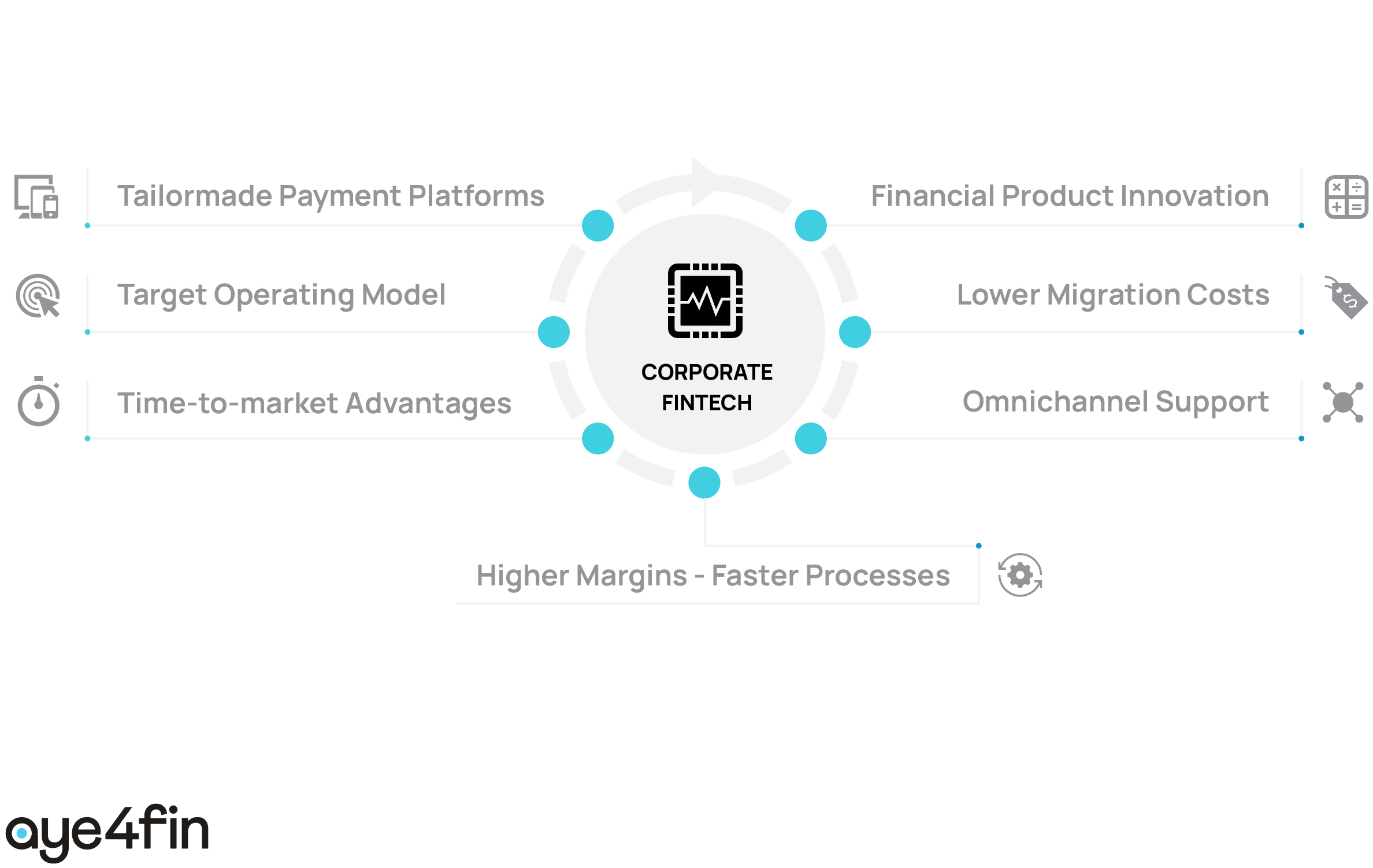Corporate Fintechs: the path to faster innovation in the payment environment for big businesses
What can German corporations learn from the business models of Amazon, Google and Apple? In an increasingly dynamic environment, companies that have control over their own financial flows and process payments themselves benefit in many ways, knows Thomas Tittelbach, CEO and founder of aye4fin. The expert for international payments and complex payment solutions explains why setting up internal Fintechs is worthwhile for large companies.
Existing structures limit the introduction of innovative business models
Companies increasingly need to access new sales channels, markets or even business models in order to remain competitive and customer focused. In times of increasing digitization, this also requires innovative payment processes based on state-of-the-art technology. Especially established companies often struggle here, as their existing structures do not sufficiently support the introduction of new innovative offerings. Companies therefore need to find new ways to act more flexibly and to be able to design processes according to their own – and, above all, their customers’ – needs.
At aye4fin, we have implemented various projects related to innovative payment solutions in recent years. While working with teams from both the business and the tech side, we have recognized that especially well-established companies become faster and more agile in building digital business models by establishing internal “Corporate Fintechs”.
Corporate Fintech as a solution - But what is a Corporate Fintech?
A Corporate Fintech is essentially a startup – or department – within the financial department that can independently build and implement innovative solutions with a high degree of technical efforts in a short period of time.
Corporate Fintechs are made up of experts with both business and technical backgrounds and thus enable innovative payment solutions to be developed and rolled out more efficiently and more quickly thanks to a bundled interdisciplinary team. In this context, the close collaboration of Corporate Fintechs with experts from the finance and treasury departments is highly important in order to receive key guidance in terms of compliance and governance.
A Corporate FinTech is essentially a startup – or department – within the financial department that can independently build and implement innovative solutions with a high degree of technical efforts in a short period of time.
Corporate FinTechs are made up of experts with both business and technical backgrounds and thus enable innovative payment solutions to be developed and rolled out more efficiently and more quickly thanks to a bundled interdisciplinary team. In this context, the close collaboration of Corporate FinTechs with experts from the finance and treasury departments is highly important in order to receive key guidance in terms of compliance and governance.
Successful examples of corporate Fintechs
OTTO, a major German retailer, has long recognized the limits of corporate structures. Being dependent on a single payment service provider, prevents companies from designing the customer experience – the core of a successful online marketplace – according to their needs. Attempting to do so is usually costly, inflexible and unsatisfying. What’s more, in most cases it’s also neither user-friendly nor profitable. Companies like OTTO have recognized these limitations and developed their own solution.
More control and flexibility by setting up an individual payment service provider
OTTO as well as REWE have built up their own payment service providers, which can be regarded as Corporate Fintechs and which now also have “small bank licenses” allowing them to offer their customers additional services. With a “small banking license,” which is possible in Germany under the ZAG (“Zahlungsdiensteaufsichtsgesetz”) for example, it is not possible to grant loans, but it is possible to define the payment processing and associated customer processes independently. Such a banking license is therefore used, among other things, to offer more customer-friendly processes, to handle certain forms of payment completely independently, or to decide what to hold internally or what to hand out to partners, such as the issue of financing. This is the first step in building more value internally.
Building up these internal competencies also enables companies to enter into more partnerships, for example for international payment processing, as the rigid specifications of external service providers are eliminated. Companies can therefore negotiate with banks and other financial institutions at eye level – giving them a significant edge over competitors.
Companies with a high drive for innovation benefit from a Corporate Fintech
Especially internationally operating companies with a high drive for innovation need to establish structures and systems that support diverse business models in an efficient and scalable manner. If this does not happen in time, risks to future competitiveness and high migration costs are likely the result.
The global online marketplace Amazon recognized this many years ago and established its own corporate Fintech in Luxembourg to enable ideal customer processes and low dependencies on third parties. Without middlemen, processes become faster and more independent – and margins turn out higher. In addition, companies become more flexible. They can easily and independently bring product innovations to market, make better offers to their customers, and introduce new business models in other countries.
How can aye4fin support with building and managing a Corporate Fintech?
It’s not a question of technological feasibility, but of knowledge about setting up and operating modern payment processes and systems. Those who succeed in centrally bundling and managing their financial strands hold valuable know-how that provides an enormous cost and time-to-market advantage. However, this know-how must first be built up in companies. This is exactly what aye4fin’s team of consultants is there for. We can holistically implement projects from start to finish as well as support in selected processes. From applying for a banking license to the technical development of payment platforms for large and international companies, offers can be tailored precisely to the individual needs of companies.
path big businesses
